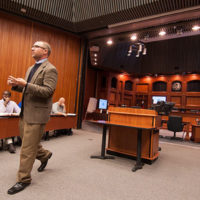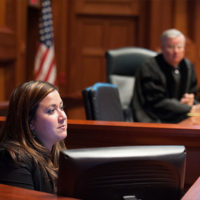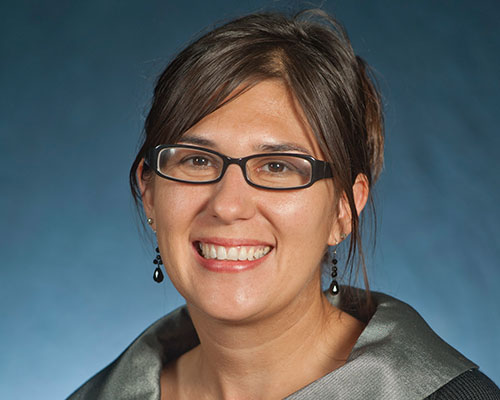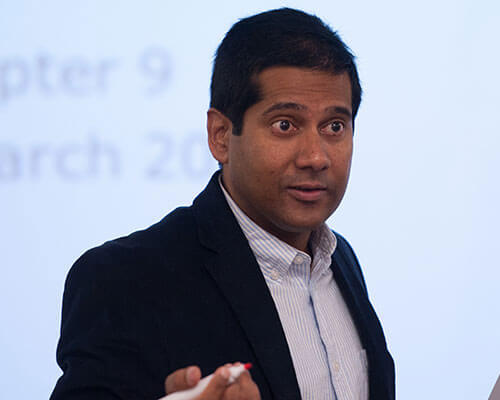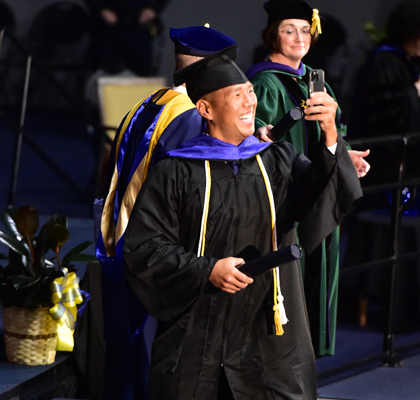Master of Legal Studies (M.L.S.) –
International and Comparative Law Concentration
The International and Comparative Law Concentration is just one of your options. See the main Master of Legal Studies page for details about the overall program and other available options.
M.L.S. International and Comparative Law Concentration
The M.L.S. in International and Comparative Law is a natural fit for professionals in diverse sectors, including people in the military, law enforcement, the intelligence community and related communities, such as the Departments of Justice, Treasury, Commerce, Energy, Environmental Protection and Homeland Security plus the state equivalents e.g., Texas DHS.
In the private sector, paralegals; those in the for-profit domestic and international business community involved in international sales, trade, investment, finance and cyber security; nonprofit organizations; media and newspaper professionals; academic professionals in select but diverse fields of interdisciplinary teaching and research, such as business, international relations, history, economics, political science and other social sciences, philosophy and ethics would also benefit.

“I am currently Active Duty in the U.S. Army and I decided to go back to school in order to utilize the Army’s Active Duty Green-To-Gold Option in a pursuit to obtain a Master’s Degree and Commission as a U.S. Army Officer upon graduating. My decision to return to school was a desire to pursue a better understanding of the American legal system. I had already obtained a bachelor’s degree in Political Science and have always been fascinated by the law. I truly wanted to improve my analytical skills in order to plan my future career aspirations. I was ready to embark on the adventure. I can honestly say I was not scared of returning to school; however, I was very anxious in regard to adapting from everyday military life to a classroom setting after a seven-year absence. I was most excited for the opportunity to pursue a degree that will improve my legalese as well as lead to career opportunities that will solidify my family’s future.”
– Marcus Connor (M.Jur. ’19)
Professional advancement
Unlock a world of opportunity with a graduate-level education in International and Comparative Law. In today’s ever-changing global landscape, the realm of international business is undergoing a remarkable transformation. Organizations are embracing innovation and ideas from every corner of the world, reshaping the way they operate and compete on the international stage. It’s a dynamic environment filled with potential, and if you’re ready to embark on a career that navigates this intricate web of global opportunities, then an education in international policy is your key to success.
Embrace lucrative and fulfilling opportunities
International business offers a path toward financial reward and personal fulfillment. As businesses expand their horizons interntionally, the demand for professionals who can navigate the complexities of global markets is on the rise. This field offers a wealth of rewarding opportunities that allow you to make a meaningful impact on the world stage.
Your Journey Starts Here
Are you ready to embark on a journey that takes you beyond borders and into the heart of the international business world? A graduate-level education in international policy is your passport to a future filled with opportunities and impact. Don’t miss out on the chance to shape the global business practices of tomorrow. Enroll today and become a catalyst for change in the international arena. The world awaits your expertise.

Timothy J. Conlon, J.D., Practicing Faculty, has been managing compliance issues with in-house legal departments for over 20 years. He began his career in international telecom navigating Foreign Corrup Practices Act issues. After the Enron accounting scandal, Conlon built compliance programs at 3Com, Underwriters Laboratories and Integrated DNA Technologies with a focus on developing internal controls. He has developed and delivered compliance training all over the world. Conlon currently teaches a course in Cyber Law and a course in Digital Evidence and Records for St. Mary’s School of Law.
Required Courses
| Core courses |
|---|
| Fundamentals of the American Legal System |
| Legal Research and Writing |
| Choose two from the following: |
| Criminal Law |
| Constitutional Law |
| Contracts |
| Property Law |
| Torts |
Concentration Emphasis Courses
| Course Name | Course Numbers |
|---|---|
| Public International Law | LW 7704 |
| Comparative Law | LW 7380 |
| Human Trafficking | LW 7265 |
| International Alternative Dispute Resolution | LW 7600 |
| International Business Transactions | LW 8604 |
| International Criminal Law | LW 6200 |
| Cyber Law | LW 5313 |
| International White Collar Crime | LW 5609 |
| Digital Evidence and Records | LW 5612 |
| Negotiations | LW 5310 |
Request Information
Curious which Law Certificate is right for you? Questions about the admission process or the program? Our team will answer any questions and help you through the process when you’re ready.
- Visit campus
- Request information by emailing mls@stmarytx.edu
or complete the following form.
Applying to the M.L.S.
See details about admission requirements and how to apply:











